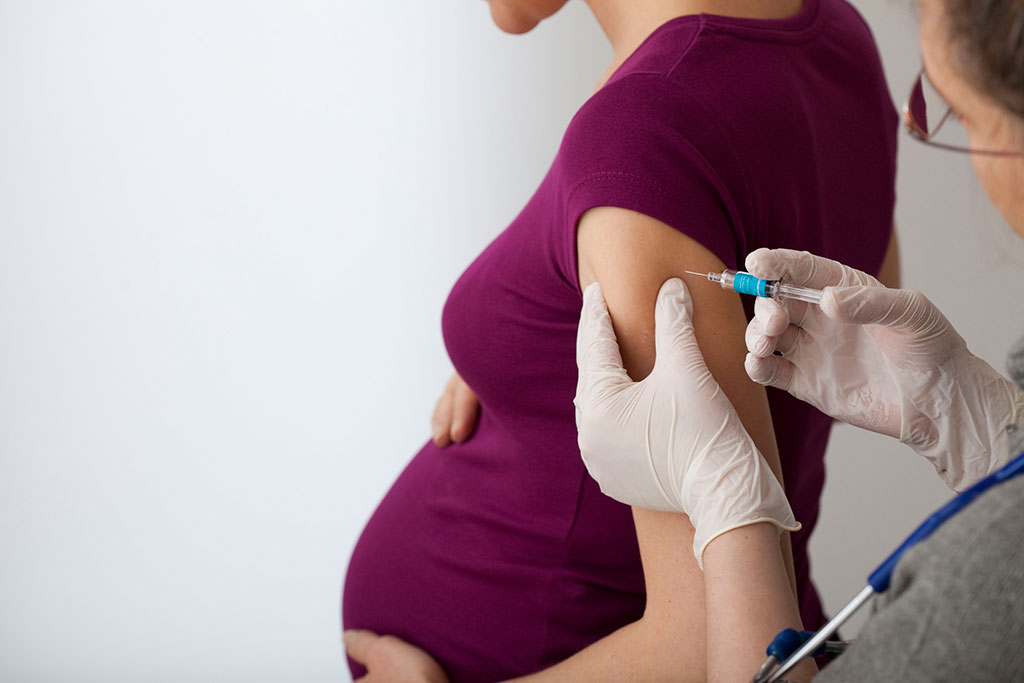Pregnant Women Should Be Offered COVID-19 Vaccine
|
By HospiMedica International staff writers Posted on 20 Jan 2021 |

Image: Pregnant women can vaccinate against COVID-19 if they so desire (Photo courtesy of Getty Images)
A new guidance suggests that COVID-19 vaccines should not be withheld from pregnant or lactating women who want to be vaccinated, despite a lack of safety data.
Issued by the American College of Obstetricians and Gynecologists (ACOG; Washington DC, USA), the practice advisory recommends that COVID-19 vaccines should not be withheld from pregnant individuals who meet criteria, and recommends use of the Pfizer-BioNTech COVID-19 vaccine in persons aged 16 years or older, and the Moderna-1273 COVID-19 vaccine for those aged 18 years or older. COVID-19 vaccines should be offered to both lactating and non-lactating women individuals when they meet criteria for receipt of the vaccine.
ACOG reiterates that the vaccines currently available have not been tested in pregnant women, and that therefore there are no safety data specific to use in pregnancy. Important points to consider prior to vaccination include level of activity of the virus in the community, potential efficacy of the vaccine, risk and potential severity of maternal disease, the effects of disease on the fetus and newborn, and safety of the vaccine for the pregnant mother and the fetus. Pregnancy testing should not be a requirement prior to receiving any COVID-19 vaccine.
ACOG also suggests that while a conversation with a clinician may be helpful, it should not be required prior to vaccination, as this may cause unnecessary barriers to access. Pregnant patients who decline vaccination should be supported in their decision; regardless of their decision to receive or not receive the vaccine, these conversations provide an opportunity to remind patients about the importance of other prevention measures such as hand washing, physical distancing, and wearing a mask.
“Expected side effects should be explained as part of counseling, including that they are a normal part of the body’s reaction to the vaccine and developing antibodies to protect against COVID-19 illness,” concluded the statement by the ACOG immunization, infectious disease, and public health preparedness expert work group. “mRNA vaccines are not live virus vaccines, nor do they use an adjuvant to enhance vaccine efficacy; these vaccines do not enter the nucleus and do not alter human DNA in vaccine recipients. As a result, mRNA vaccines cannot cause any genetic changes.”
Available data suggest that symptomatic pregnant patients with COVID-19 are at increased risk of ICU admission, need for mechanical ventilation, and death, compared to symptomatic non-pregnant women. Pregnant patients with comorbidities such as obesity and diabetes may be at an even higher risk of severe illness, consistent with the general population with similar comorbidities.
Related Links:
American College of Obstetricians and Gynecologists
Issued by the American College of Obstetricians and Gynecologists (ACOG; Washington DC, USA), the practice advisory recommends that COVID-19 vaccines should not be withheld from pregnant individuals who meet criteria, and recommends use of the Pfizer-BioNTech COVID-19 vaccine in persons aged 16 years or older, and the Moderna-1273 COVID-19 vaccine for those aged 18 years or older. COVID-19 vaccines should be offered to both lactating and non-lactating women individuals when they meet criteria for receipt of the vaccine.
ACOG reiterates that the vaccines currently available have not been tested in pregnant women, and that therefore there are no safety data specific to use in pregnancy. Important points to consider prior to vaccination include level of activity of the virus in the community, potential efficacy of the vaccine, risk and potential severity of maternal disease, the effects of disease on the fetus and newborn, and safety of the vaccine for the pregnant mother and the fetus. Pregnancy testing should not be a requirement prior to receiving any COVID-19 vaccine.
ACOG also suggests that while a conversation with a clinician may be helpful, it should not be required prior to vaccination, as this may cause unnecessary barriers to access. Pregnant patients who decline vaccination should be supported in their decision; regardless of their decision to receive or not receive the vaccine, these conversations provide an opportunity to remind patients about the importance of other prevention measures such as hand washing, physical distancing, and wearing a mask.
“Expected side effects should be explained as part of counseling, including that they are a normal part of the body’s reaction to the vaccine and developing antibodies to protect against COVID-19 illness,” concluded the statement by the ACOG immunization, infectious disease, and public health preparedness expert work group. “mRNA vaccines are not live virus vaccines, nor do they use an adjuvant to enhance vaccine efficacy; these vaccines do not enter the nucleus and do not alter human DNA in vaccine recipients. As a result, mRNA vaccines cannot cause any genetic changes.”
Available data suggest that symptomatic pregnant patients with COVID-19 are at increased risk of ICU admission, need for mechanical ventilation, and death, compared to symptomatic non-pregnant women. Pregnant patients with comorbidities such as obesity and diabetes may be at an even higher risk of severe illness, consistent with the general population with similar comorbidities.
Related Links:
American College of Obstetricians and Gynecologists
Latest Patient Care News
- Revolutionary Automatic IV-Line Flushing Device to Enhance Infusion Care
- VR Training Tool Combats Contamination of Portable Medical Equipment
- Portable Biosensor Platform to Reduce Hospital-Acquired Infections
- First-Of-Its-Kind Portable Germicidal Light Technology Disinfects High-Touch Clinical Surfaces in Seconds
- Surgical Capacity Optimization Solution Helps Hospitals Boost OR Utilization

- Game-Changing Innovation in Surgical Instrument Sterilization Significantly Improves OR Throughput
- Next Gen ICU Bed to Help Address Complex Critical Care Needs
- Groundbreaking AI-Powered UV-C Disinfection Technology Redefines Infection Control Landscape
- Clean Hospitals Can Reduce Antibiotic Resistance, Save Lives
- Smart Hospital Beds Improve Accuracy of Medical Diagnosis
- New Fast Endoscope Drying System Improves Productivity and Traceability
- World’s First Automated Endoscope Cleaner Fights Antimicrobial Resistance
- Portable High-Capacity Digital Stretcher Scales Provide Precision Weighing for Patients in ER
- Portable Clinical Scale with Remote Indicator Allows for Flexible Patient Weighing Use
- Innovative and Highly Customizable Medical Carts Offer Unlimited Configuration Possibilities
- Biomolecular Wound Healing Film Adheres to Sensitive Tissue and Releases Active Ingredients
Channels
Critical Care
view channel
Light-Based Technology to Measure Brain Blood Flow Could Diagnose Stroke and TBI
Monitoring blood flow in the brain is crucial for diagnosing and treating neurological conditions such as stroke, traumatic brain injury (TBI), and vascular dementia. However, current imaging methods like... Read more
AI Heart Attack Risk Assessment Tool Outperforms Existing Methods
For decades, doctors have relied on standardized scoring systems to assess patients with the most common type of heart attack—non-ST-elevation acute coronary syndrome (NSTE-ACS). The GRACE score, used... Read moreSurgical Techniques
view channel
Robotic Assistant Delivers Ultra-Precision Injections with Rapid Setup Times
Age-related macular degeneration (AMD) is a leading cause of blindness worldwide, affecting nearly 200 million people, a figure expected to rise to 280 million by 2040. Current treatment involves doctors... Read more
Minimally Invasive Endoscopic Surgery Improves Severe Stroke Outcomes
Intracerebral hemorrhage, a type of stroke caused by bleeding deep within the brain, remains one of the most challenging neurological emergencies to treat. Accounting for about 15% of all strokes, it carries... Read moreHealth IT
view channel
Printable Molecule-Selective Nanoparticles Enable Mass Production of Wearable Biosensors
The future of medicine is likely to focus on the personalization of healthcare—understanding exactly what an individual requires and delivering the appropriate combination of nutrients, metabolites, and... Read moreBusiness
view channel
Philips and Masimo Partner to Advance Patient Monitoring Measurement Technologies
Royal Philips (Amsterdam, Netherlands) and Masimo (Irvine, California, USA) have renewed their multi-year strategic collaboration, combining Philips’ expertise in patient monitoring with Masimo’s noninvasive... Read more
B. Braun Acquires Digital Microsurgery Company True Digital Surgery
The high-end microsurgery market in neurosurgery, spine, and ENT is undergoing a significant transformation. Traditional analog microscopes are giving way to digital exoscopes, which provide improved visualization,... Read more
CMEF 2025 to Promote Holistic and High-Quality Development of Medical and Health Industry
The 92nd China International Medical Equipment Fair (CMEF 2025) Autumn Exhibition is scheduled to be held from September 26 to 29 at the China Import and Export Fair Complex (Canton Fair Complex) in Guangzhou.... Read more















